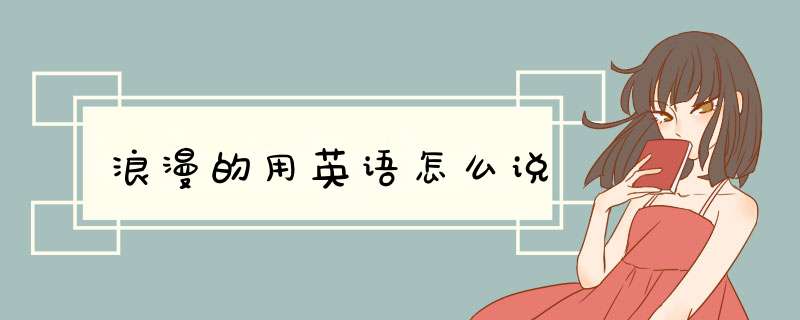
romantic
adj
浪漫的, 风流的, 感情热烈的, 喜欢幻想的
传奇式的; 富有浪漫气氛的
空想的; 虚构的; 荒诞的; 夸大的
romantic tales [adventures]
传奇式的故事[冒险]
romantic scenes
富于浪漫色彩的情景[景色]
a romantic scheme
不现实的计划
a romantic report
夸大的报道
the romantic poets
浪漫派诗人
浪漫:
1 romantic
2 romance
Examples:
1 据说法国人是世界上最浪漫的民族之一。
It is said that Frenchmen are among the most romantic people in the world
2 浪漫的女主人公往往难以捉摸。
Romantic heroines are often capricious
3 她认为看浪漫小说是虚度时光。
She thought that reading romantic novels was a frivolous way of spending her time
4 他是个非常浪漫的人。
He is a very romantic person
5 古修道院的废墟在月光下显得颇有浪漫气息。
The old abbey ruins look very romantic in the moonlight
6 有人告诉我说,西班牙是个浪漫的国家。
I was told that Spain is a romantic nation
7 她写了很多浪漫小说,质量很差。
She churns out romantic novels
8 有些诗人,如济慈和雪莱,写的是浪漫主义的诗歌。
Such poets as Keats and Shelley wrote Romantic poetry
“浪漫”的英文单词:
passion(越狱里苏克雷给GF写信,求浪漫词,米帅说:try passion)
whisper(sexy吧)
soul(I love you deep in my soul--take me to your heart )
breeze(only the breeze konws how much I miss you)
melody(unchined melody)
promise(won't come easy)
memory(we shared the sweetest memory)
rythm(of the rain)
sunshine(you are my sunshine)
rainbow(Isn't it beautiful)
浪漫(Romanticism)是开始于18世纪西欧的艺术、文学、和文化运动,大约就发生在1790年工业革命开始的前后。它注重以强烈的情感作为美学经验的来源,并且开始强调如不安、惊恐等情绪,以及人在遭遇到大自然的壮丽时表现出的敬畏。
浪漫主义是对于启蒙时代以来的贵族和专制政治文化的颠覆,以艺术和文学反抗对于自然的人为理性化。浪漫主义重视民间艺术、自然、以及传统,主张一个根基于自然的知识论,以自然的环境来解释人类的活动,包括了语言、传统、习俗。
浪漫主义受到了启蒙运动的理念影响,也吸收了中世纪文化复古的艺术成分。“浪漫”一词来自于“romance”—代表了源于中世纪文学和浪漫文学里颂扬英雄的诗赋风格。
欢迎分享,转载请注明来源:浪漫分享网

 微信扫一扫
微信扫一扫
 支付宝扫一扫
支付宝扫一扫
评论列表(0条)